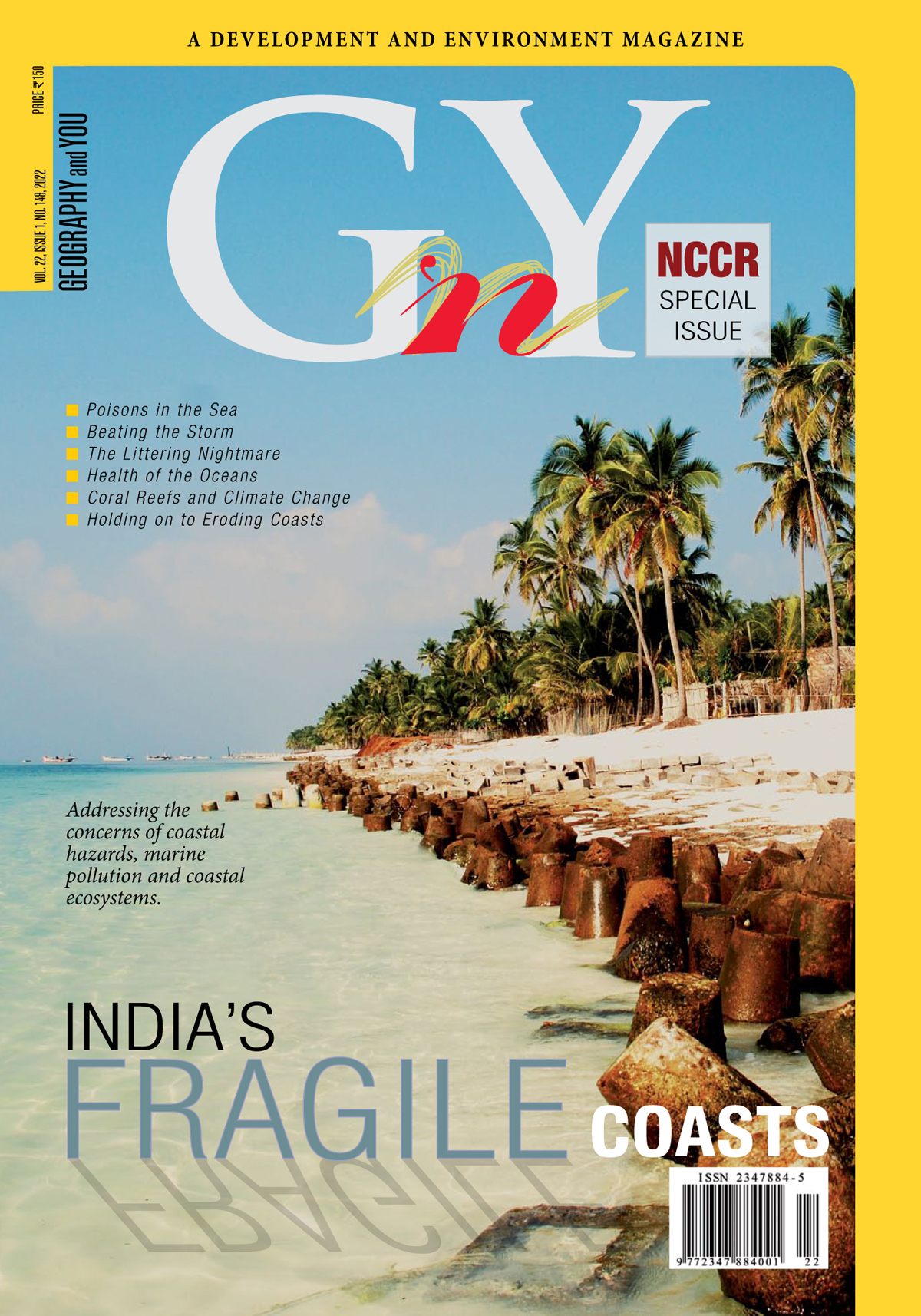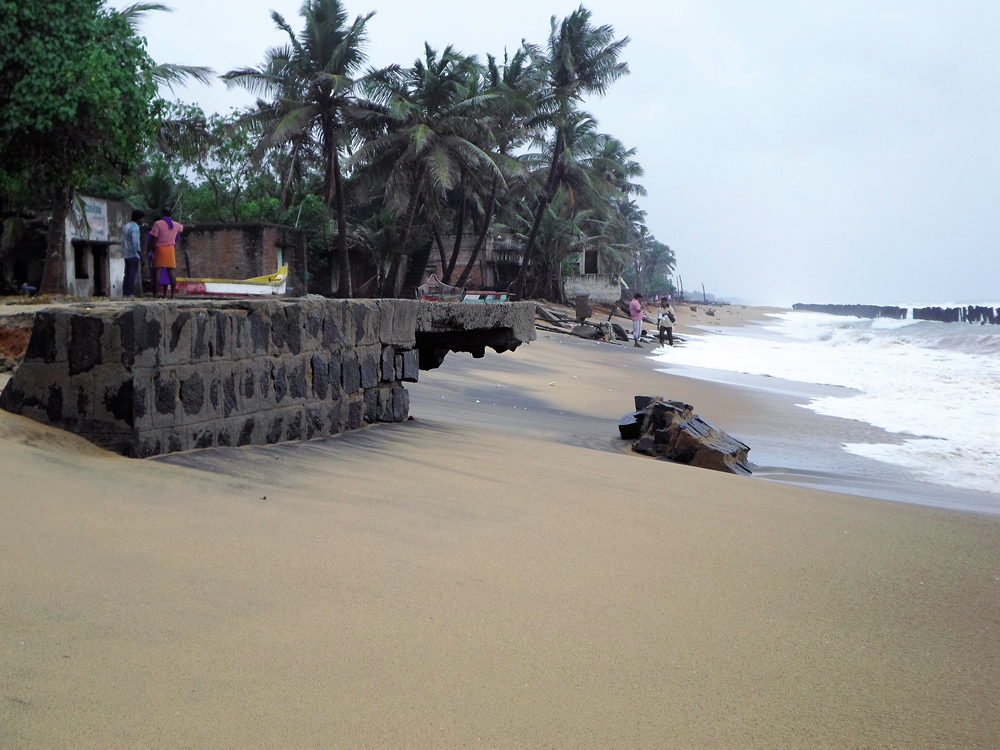
Inside this issue
Opinion
Monitoring from space, aerial and in situ platforms in coastal regions will help develop models for interactions between ecological and anthropogenic processes, helping sustainable management of coastal zones.
Coastal Research
The Indian coastline sustains unique habitats that are subjected to increasing anthropogenic stressors. The National Centre for Coastal Research (NCCR), engaged in addressing coastal concerns over three decades, intends to undertake interdisciplinary research, integrating coastal zone management, bioinformatics and eco-engineering. Efforts are underway to translate research into policy for nature-based solutions for sustainable coastal ecosystems.
The Indian coasts hold diverse geomorphological features—mudflats, rocky shores, cliffs, sandy beaches and deltaic reaches that shelter unique ecosystems. However, significant sections of the coastline are vulnerable to erosion, inundation, and shoreline changes, both natural and anthropogenic. The National Centre for Coastal Research (NCCR) Shoreline Change Atlas indicates that 33.6 per cent of India’s coast is undergoing erosion, 39.6 per cent is stable and 26.9 per cent is accreting.
Integrated Flood Warning System (IFLOWS) is an integrated GIS-based decision support system developed for Chennai and Mumbai that provides flood inundation scenarios and helps state governments to put mitigative measures in place.
The Indian coastal ecosystems are threatened by climate change and human advancement—jeopardising its services. Protecting coastal systems from multiple pressures is one of the largest environmental concerns facing the global community. The Seawater quality monitoring programme (SWQM) implemented by the National Centre for Coastal Research (NCCR), Ministry of Earth Sciences, is one such strategy that facilitates coastal protection. The data collected for 50 locations along the Indian coast under the SWQM programme is designed to provide much-needed information to multiple stakeholders.
Poisonous chemicals let out into the sea are entering the food chain—interfering with the marine ecosystem. The resultant loss of biodiversity, coral bleaching, ocean acidification and harmful algal blooms needs to be assessed urgently. The setting of threshold levels for all hazardous heavy metals is imperative and the nation needs to update the existing regulatory guidelines and standards with sound scientific data.
Plastic litter and waste in the marine environment impact global ecology and the environment of the oceans. To understand the extent of the problem, India initiated a nationwide programme to collect data on plastic debris and its dispersal in coastal and offshore environments. These studies include the ubiquitous distribution of microplastics and litter near urban outfalls, tourist destinations and recreational areas into the marine systems. Segregation of wastes, installation of floating traps in the waterways and implementable environmental legislation are the ways to address the concern.
Coral reefs are one of the most productive and biodiverse marine ecosystems on earth which are currently facing imminent risk of collapse globally due to natural and anthropogenic stressors. One of the critical factors is the El Niño Southern Oscillation (ENSO) events. For example, elevated sea surface temperature (ESST) anomalies of 1998, 2010, and 2016 and consequent events have resulted in a drastic decline in coral reefs in several parts of India. However, the dynamics and mechanisms driving these changes and their effect on ecosystem functions are poorly understood.
Reef health monitoring and assessments are integral and imperative components of ecosystem management in order to save the critical coral habitat. A comprehensive reef health status of scleractinian corals in Gulf of Mannar and Palk Bay with a documentation of 79 reef building coral species, belonging to 13 families and 22 genera have been undertaken by the National Centre for Coastal Research. The average live coral cover showed significant increase despite natural and anthropogenic disturbances in the Gulf of Mannar and Palk Bay. Corals have been restored by local transplantation technique in degraded reefs of this region with 56.0 per cent survival rate and a growth rate of 1.12-1.20 cm per month.
In brief
Rescuing India’s shores I thought the clear blue waters at Jolly Bouy, Andaman, would be cold and that I would shiver when taking my first dip to snorkel to the valleys of white sand, schools of multi-coloured fish, and purple-orange tipped corals. But, as the surprisingly warm silky waters washe
Coastal research to combat the country’s varied challenges needs to be carefully crafted for sustainable coastal zone management. Although the Ministry of Earth Sciences, through the National Center for Coastal Research, Chennai, holds a long-term perspective, it is imperative for India to prepare

